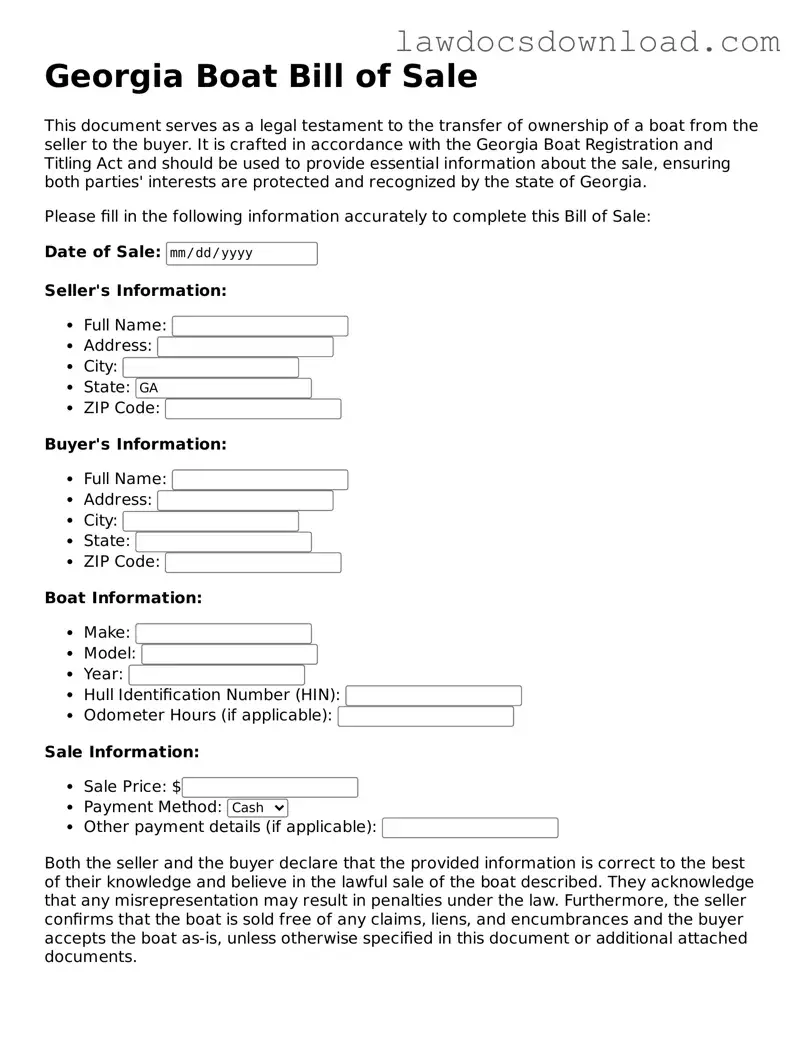The Georgia Boat Bill of Sale is similar to a Vehicle Bill of Sale, as both documents serve to record the sale and transfer of ownership of a personal property item – in one case a boat, and in the other, a vehicle. Both forms typically require detailed descriptions of the item being sold, including make, model, year, and serial or identification numbers. They also need the seller’s and buyer’s information, sale date, and price to be valid and enforceable.
Similar to a Real Estate Bill of Sale, the Georgia Boat Bill of Sale provides proof of a transfer, but instead of real estate, it deals with a boat. A Real Estate Bill of Sale is used for the transaction of property ownership, detailing the property’s location, specifications, and the terms agreed upon by both parties. Both documents act as critical records of the sale for legal and tax purposes, documenting the change of ownership and the agreement specifics.
Just like a Firearm Bill of Sale, the Boat Bill of Sale in Georgia helps ensure the legal transfer of ownership between parties. Both documents are essential for proving ownership, and they often include similar sections for the description of the item sold, including make, model, and serial number. These forms serve as protective measures for both buyer and seller by detailing the transaction and preventing potential legal disputes.
Comparable to a Business Bill of Sale, the Boat Bill of Sale documents the sale of a valuated asset, only in this case, the asset is a boat. The Business Bill of Sale is used when entire businesses or parts thereof are bought or sold, covering assets like equipment, inventory, and company goodwill. Though the scope of the items sold differs, both forms fulfill the purpose of recording the terms of a sale and the transfer of ownership.
A Bill of Sale for General Personal Property is akin to the Georgia Boat Bill of Sale as they both formalize the sale of personal items. Regardless of whether the sale item is a boat or any other personal property like furniture, electronics, or other valuables, the main function is to provide written evidence of the transaction, including details like the sale price, date, and party information.
The Georgia Boat Bill of Sale shares similarities with a Livestock Bill of Sale. Both are specific to the kind of item they cover – one for boats and the other for animals like horses, cattle, and sheep. Each document includes details about the item being sold, the sale amount, and the parties involved, ensuring that the transaction is recorded in a legal and formal manner.
Like an Equipment Bill of Sale, the Georgia Boat Bill of Sale records the sale of specific items, in this instance, a boat. The Equipment Bill of Sale is used for the sale of machinery and equipment and includes necessary details such as the item’s description, condition, and any warranties. Despite focusing on different items, both documents are critical for delineating the terms of the sale and confirming the transfer of ownership.
An Aircraft Bill of Sale is also akin to the Georgia Boat Bill of Sale, as both are used for high-value items and include detailed information regarding the items being sold, such as make, model, and identification numbers. Although one deals with boats and the other with aircraft, each serves as a legal record of the transaction, providing a safety net against future disputes by clearly outlining the agreement between buyer and seller.

